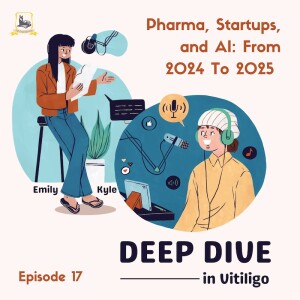
Sunday Dec 22, 2024
Pharma, Startups, and AI: From 2024 to 2025 (Ep. 17)
In the 17th episode of Deep Dive in Vitiligo, we wrap up the year with a thoughtful analysis of the vitiligo drug development landscape, exploring the breakthroughs, challenges, and opportunities shaping the future of care. From pharmaceutical giants to AI-driven startups, we delve into the science, strategies, and collaborations pushing the boundaries of what’s possible.
The Titans of Treatment
Leading the charge is Incyte with Opzelura, the first FDA-approved topical treatment, alongside Pfizer, advancing its oral drug Litfulo through Phase 3 trials. These major players are setting new benchmarks in targeted therapies, but as the field grows, questions remain about accessibility, affordability, and long-term efficacy.
Innovation and Collaboration
Smaller players are also making waves. One standout is Skinopathy, a Canadian company innovating in AI-driven care. In collaboration with the VRF, Skinopathy is working to develop a comprehensive AI-care system for vitiligo—combining diagnostics, treatment tracking, and patient management tools. This partnership demonstrates how AI, when guided by robust expertise, has the potential to empower patients and enhance care.
The Market at a Glance
The vitiligo treatment market is projected to grow to $822.75 million by 2028, driven by increasing awareness, rising prevalence, and substantial R&D investment. Yet, this growth isn’t without challenges, from regulatory hurdles to ensuring equitable access.
A Multifaceted Approach
We explore a wide array of players and their approaches:
- Amgen and its IL-15 signaling blocker AMG 714
- Merck, leveraging its acquisition of Pandion Therapeutics for regulatory T cell expansion with MK-6194
- AbbVie, investigating small molecule inhibitors for immune-mediated diseases
- Vyne Therapeutics and its novel BET inhibitor VYN201
- Ahammune Biosciences, advancing AB1001, targeting T cell activation to halt vitiligo’s spread.
Why It Matters
At the intersection of science, technology, and patient care lies a vital question: How do we ensure that these advancements translate into meaningful outcomes for those living with vitiligo? This episode highlights the importance of balancing innovation with accessibility and the role of collaboration in creating solutions that serve patients, providers, and the broader community.
Tune in as we explore the future of vitiligo treatments and the transformative potential of science and technology working together.
Listen now, and be part of the conversation shaping the next chapter in vitiligo care.
Key moments
- [00:00:00] Welcome and Introduction: Setting the stage for an in-depth dive into vitiligo drug development.
- [00:00:42] Market Outlook: Vitiligo treatment market poised to reach $2 billion by 2026.
- [00:01:09] Industry Leaders: Incyte and their FDA-approved drug Opzelura—what sets it apart.
- [00:05:12] Pfizer's Competitive Edge: Lituflo’s oral formulation and its game-changing potential.
- [00:10:27] Innovation Highlights: Amgen's AMG 714, targeting IL-15 for immune system regulation.
- [00:15:33] Inclusivity in Focus: Clinuvel’s unique approach for patients with darker skin tones.
- [00:18:40] Futuristic Therapies: Temprion Therapeutics and DNA-based whole-body repigmentation.
- [00:23:19] Beyond Drugs: Skinopathy’s AI-powered diagnostics transforming vitiligo care.
- [00:27:08] Emotional Impact: Vitiligo's effects on self-esteem and the importance of patient advocacy.
- [00:30:00] Risks and Trade-offs: Navigating long-term concerns and immune suppression challenges.
- [00:35:12] Looking Ahead: Personalized medicine, AI, and a collaborative ecosystem driving hope.
Suggested reading:
- Vitiligo Drug Pipeline Analysis and Market Insights
- The Real Price Tag of Treating Vitiligo: What You Need to Know
No comments yet. Be the first to say something!